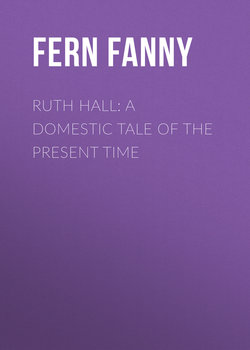Читать книгу Ruth Hall: A Domestic Tale of the Present Time - Fern Fanny - Страница 11
CHAPTER X
Оглавление“You will be happy here, dear Ruth,” said Harry; “you will be your own mistress.”
Ruth danced about, from room to room, with the careless glee of a happy child, quite forgetful that she was a wife and a mother; quite unable to repress the flow of spirits consequent upon her new-found freedom.
Ruth’s new house was about five miles from the city. The approach to it was through a lovely winding lane, a little off the main road, skirted on either side by a thick grove of linden and elms, where the wild grape-vine leaped, clinging from branch to branch, festooning its ample clusters in prodigal profusion of fruitage, and forming a dense shade, impervious to the most garish noon-day heat; while beneath, the wild brier-rose unfolded its perfumed leaves in the hedges, till the bees and humming-birds went reeling away, with their honeyed treasures.
You can scarce see the house, for the drooping elms, half a century old, whose long branches, at every wind-gust, swept across the velvet lawn. The house is very old, but Ruth says, “All the better for that.” Little patches of moss tuft the sloping roof, and swallows and martens twitter round the old chimney. It has nice old-fashioned beams, running across the ceiling, which threaten to bump Harry’s curly head. The doorways, too, are low, with honeysuckle, red and white, wreathed around the porches; and back of the house there is a high hill (which Ruth says must be terraced off for a garden), surmounted by a gray rock, crowned by a tumble-down old summer-house, where you have as fine a prospect of hill and valley, rock and river, as ever a sunset flooded with rainbow tints.
It was blessed to see the love-light in Ruth’s gentle eyes; to see the rose chase the lily from her cheek; to see the old spring come back to her step; to follow her from room to room, while she draped the pretty white curtains, and beautified, unconsciously, everything her fingers touched.
She could give an order without having it countermanded; she could kiss little Daisy, without being called “silly;” she could pull out her comb, and let her curls flow about her face, without being considered “frivolous;” and, better than all, she could fly into her husband’s arms, when he came home, and kiss him, without feeling that she had broken any penal statute. Yes; she was free as the golden orioles, whose hanging nests swayed to and fro amid the glossy green leaves beneath her window.
But not as thoughtless.
Ruth had a strong, earnest nature; she could not look upon this wealth of sea, sky, leaf, bud, and blossom; she could not listen to the little birds, nor inhale the perfumed breath of morning, without a filling eye and brimming heart, to the bounteous Giver. Should she revel in all this loveliness, – should her heart be filled to its fullest capacity for earthly happiness, and no grateful incense go up from its altar to Heaven?
And the babe? Its wondering eyes had already begun to seek its mother’s; its little lip to quiver at a harsh or discordant sound. An unpracticed hand must sweep that harp of a thousand strings; trembling fingers must inscribe, indelibly, on that blank page, characters to be read by the light of eternity: the maternal eye must never sleep at its post, lest the enemy rifle the casket of its gems. And so, by her child’s cradle, Ruth first learned to pray. The weight her slender shoulders could not bear, she rolled at the foot of the cross; and, with the baptism of holy tears, mother and child were consecrated.
